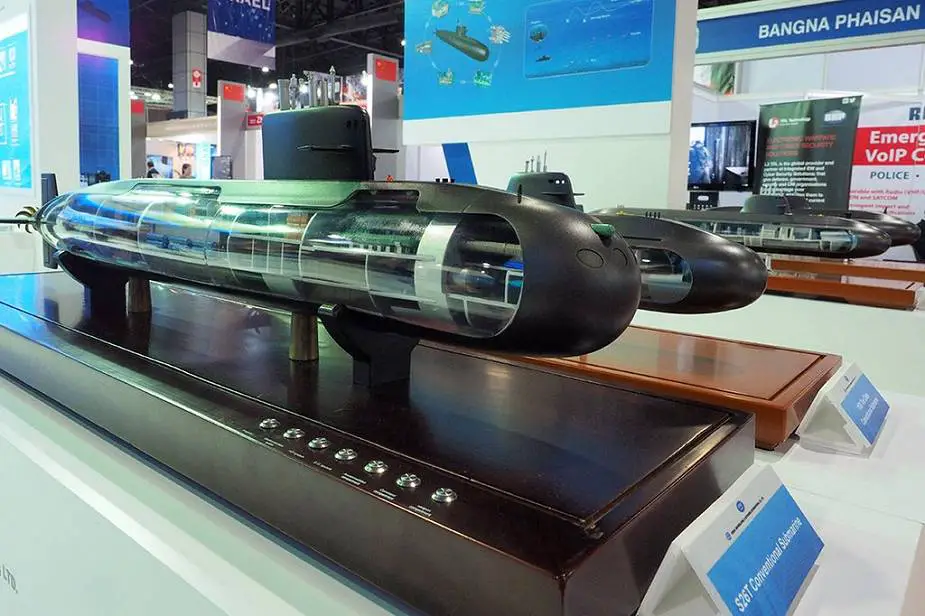Last week, Prime Minister of Thailand, Prayut Chan-o-cha warned that the planned submarine procurement deal with China may be shelved if Beijing is unable to fit the engines specified in the purchase agreement.
He was addressing questions from journalists following reports of the German company’s refusal to supply MTU396 diesel engines to China to be fitted into the S26T Yuan-class submarine being built for the Royal Thai Navy (RTN).
“What do we do with a submarine with no engines? Why should we purchase it?” said Prayut.
When asked if the government can terminate the contract, Prayut said the matter will be considered by relevant authorities and in accordance with the procurement process and that the prime minister need not intervene at every stage.
He also affirmed that any cancellation will not impact Thai-Chinese relations and both sides have been working closely to resolve the issue.
Under the terms of the agreement, China Shipbuilding & Offshore International Co (CSOC), a state-owned shipbuilding conglomerate is supposed to build and sell three advanced export variants of the Type 039B Yuan-class submarine – to be called the S26T – for a total cost of 36 billion baht (US$1.16 billion) to be paid in 11 annual installments.

Under the terms of the deal, the submarine’s engines were to be supplied by Germany’s Motoren- und Turbinen-Union (MTU), but the company was barred from making the sale due to an embargo as they are designated a military/defense item.
In 1989, the EU imposed an arms embargo on China following the violent suppression of pro-democracy protests in Beijing’s Tiananmen Square.
“The export [of the engine] was refused because of its use for a Chinese Military/Defense industry item,” Philipp Doert, the German defense attaché to Thailand told the Bangkok Post. “China did not ask/coordinate with Germany before signing the Thai-China contract, offering German MTU engines as part of their product.”
One of the major structural weaknesses of the Chinese military industry is propulsion engineering, as the majority of engines used in Chinese submarines are of foreign technology.
For example, both the Song and Yuan-class attack submarines which represent the bulk of China’s conventional submarine fleet are equipped with German-made state-of-the-art MTU 396 SE84 series diesel engines.
In a 2015 conference on the Chinese Navy’s capabilities at the U.S. Naval War College (NWC), Professor Andrew Erickson, NWC’s China Maritime Studies Institute (CMSI), noted that propulsion engineering remains a work in progress in the PLAN’s [People’s Liberation Army Navy’s] underwater force.
“Here’s where things become more demanding for them,” Erickson said. They’re going to want to be able to build a significant number of [attack submarines] whose reactors are efficient, long-lasting, reliable, and quiet enough. There’s no way to compensate for quietness if you don’t have it.”
The production of modern-day engines is technologically very demanding and minor imprecisions can have grave consequences. Only a handful of producers around the world such as Germany’s MTU, possess the necessary technical expertise to build such diesel engines.
“They are the world’s leading submarine diesel engines,” an experienced submarine engineer has said about the MTU engines.
As per the estimates of the Stockholm International Peace Research Institute (SIPRI) which follows the arms deals made around the world, MTU has provided China with over 100 of its engines for its destroyers and submarines from 1993 through 2020 despite the EU arms embargo.
According to Jon Grevatt, who covers the Asia-Pacific defense industrial news for Janes, these engines come under dual-use items which are not included in the EU trade ban with China but the sale of submarines to Thailand, however, made the deal more difficult.
“If this submarine wasn’t being exported to Thailand, no one would know about it and therefore it would go ahead. But the fact that it is being exported, it’s in the news, is cause for the German government to say, ‘oh, no…we’re not allowing that,’” Grevatt said.
On April 2nd, Commander of the RTN, Admiral Somprasong Nilsamai said that no changes had been made to the submarine deal and insisted that China would have to comply with the contract.
While the navy spokesman Vice Admiral Pokkrong Monthatphalin said that the navy would hold talks with CSOC this month to resolve the problem even though it stands by the purchase-agreement stipulation.
CSOC has asked the navy to alter the contract to replace the German engines with Chinese ones such as the MWM 620 which are of the same standard, but the navy is standing by the original contract.
“The engine is not well proven yet, so the Royal Thai Navy is still waiting for the answer from [CSOC] to ensure that this engine is as good as the MTU,” Rear Admiral Apichai Sompolgrunk, the director-general of the Thai navy’s purchasing office told Voice of America (VOA).
Grevatt said CSOC would have a hard time replacing the MTU engine and Thailand “either manages to get the [MTU] engine or sees if China can produce one on its own.”
Reports suggest that a Chinese manufacturer does have a license for MTU 396 diesel engines.
- Written by Tanmay Kadam/EurAsian Times Desk
- Contact the author at etdesk@eurasiantimes.com
- Follow EurAsian Times on Google News